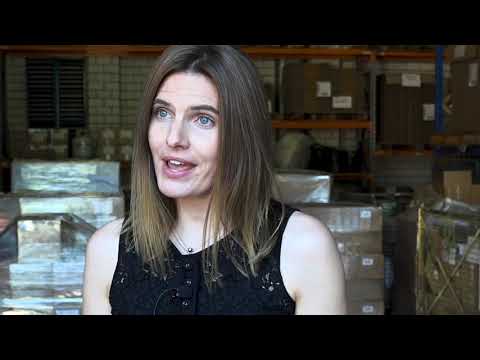SAP targets 5% of annual addressable procurement spend to social enterprises and 5% to diverse businesses by 2025 to tackle social inequalities and environmental imperatives
SAP SE today announced 5 & 5 by ‘25, a corporate initiative targeting five per cent of addressable spend[1] with social enterprises and five per cent with diverse businesses by 2025. In setting this target, SAP aims to inspire organisations around the world to buy more goods and services from purposeful suppliers, making a positive collective impact on the societies they operate in.
Social enterprises are businesses culturally and operationally focused on changing the world. They are similar to other commercially viable businesses, but with three crucial differences: They are founded and governed on the basis of a clear social or environmental mission; they reinvest the majority of their profit back into this mission; and they are majority controlled solely in the interest of this mission. A diverse supplier is a business that is at least 51% owned and operated by an individual or group that is part of a traditionally underrepresented or underserved demographic; such as women-owned businesses, minority-owned business, and indigenous-owned businesses, among others.
Global commitment, Australia leading
The commitment will impact all SAP’s global markets, but will initially be focused on Australia, the UK and Canada. Commenting on the announcement, Victorian Parliamentary Secretary for Jobs and champion of the Victorian Government’s Social Enterprise Strategy, the Hon Jane Garrett said: “It is incredibly exciting to have a leading global company like SAP helping to transform lives by growing this important sector. We hope to see more partnerships of this kind in future, to further boost Australian social enterprises and Indigenous businesses.”
According to Social Traders, an organisation that certifies Australian social enterprises and connects them with business buyers, Australian corporate procurement spend is estimated at more than AUD$600 billion. The World Bank estimates global procurement spend in 2019 was at least AUD$19.85 trillion. By directing even just a small fraction of this spend to certified social enterprises and diverse businesses, organisations have the power to tackle some of the world’s most pressing social and environmental problems.
Based on early pilots in select markets, SAP estimates it could direct up to AUD$82.5 million (EUR€50 million) of its global addressable spend per year to social enterprises and diverse suppliers by 2025. In Australia, meeting the commitment would equate to roughly AUD$1.01 million per year directed to local social enterprises and diverse suppliers.
SAP Executive Board member for Customer Success, and recently appointed Global Buy Social Ambassador for Social Enterprise UK, Adaire Fox-Martin announced the 5 & 5 by ‘25 initiative at SAP’s Procurement Reimagined event. “Every company in every industry needs to procure,” Fox-Martin said. “We all need soap in our washrooms, landscaping for our offices, food and drink in our cafeterias, marketing services, office supplies, and even pest control. These and many more are all products and services provided by social enterprises and diverse businesses. This is money we are spending anyway. Why not spend it with suppliers who are delivering social impact as well?”
Procurement with social enterprises
Recent efforts have shown promise. In a pilot in the United Kingdom, SAP teamed up with Social Enterprise UK in 2019 to define and execute on a social-procurement strategy. Within nine months, SAP had identified addressable spend of approximately GBP £30 million and directed more than 2 per cent of this to over 20 different UK social enterprises.
SAP has since expanded relationships with social enterprise interest organisations in other markets, including a partnership with Social Traders in Australia, to introduce similar programs and further globalise and scale its social procurement efforts.
Mark Daniels, Executive Director, Social Traders says, “This pledge is one of the largest of its kind in the world and demonstrates a huge public commitment to social procurement. Our research estimates that for every AUD$1,000,000 spent on social procurement, 7.5 jobs are created for disadvantaged Australians. By encouraging other organisations to participate in this initiative, SAP Australia will help drive enormous change.”
SAP is also growing its support of potential suppliers through capacity building programs like MovingWorlds’ S-GRID (Sustainable Growth of Revenues in International Development}. “What makes this moment in time so pivotal is that inequities and environmental degradation tend to increase after recessions,” said Mark Horoszowski, CEO and co-founder of MovingWorlds, SPC. “By investing in social enterprises today, we can help them integrate into the post-COVID recovery to build a more equitable society, while using regenerative business models to address the ongoing environmental crisis.”
Procurement with diverse businesses
SAP Australia already works with a diverse range of social enterprises and indigenous businesses, including:
- The Good Good: Elise Perpetua, Managing Director of organic and sustainable tea supplier The Good Good says, “We use business as a force for good by donating 50 per cent of our profits to programs that help disadvantaged kids get access to education. We also partner with the Cerebral Palsy Alliance supported employment division, Packforce, to employ Australian workers with disabilities. Our tea is better not only for the employees but for the planet and the community. Our partnership with SAP represents a great opportunity to create impact at scale in Australia. We hope that more organisations will be inspired to join us on the exciting journey of purposeful procurement, so we drive fast, positive and systemic change together.”

- Goodwill Wine: David Laity, Founder and CEO of online wine retailer Goodwill Wine says, “Following the Black Saturday bushfires, I lost almost everything. After the humbling support offered by my community, I wanted to start a social enterprise that would allow me to give back. Since our inception we’ve contributed $360,000 to a wide range of charities that support everything from those living in poverty to environmental sustainability, and we’ve done this just by selling great quality wine. Quite frankly, I’m amazed by this step from SAP, which is an incredible signal of intent from one of the world’s biggest companies. If it can inspire even a small proportion of businesses to follow its lead, this commitment will help accelerate a huge number of meaningful social initiatives”.
- Muru Office Supplies: Mitchell Ross, Founder and CEO of Indigenous-owned office supplies provider Muru Office Supplies (MOS) says, “As a business certified by Supply Nation, we have a strong commitment to supporting Indigenous community projects in the areas of education and employment. SAP has already placed orders with MOS, which will allow our community programs with partners like IndigiGrow and Mudgin-Gal to deliver even greater social impact. We hope this initiative leads to a step-change in how big businesses think about using procurement as a force for good.”
Procurement with purpose with SAP Ariba
SAP’s Ariba Network is the largest business-to-business marketplace in the world, supporting nearly AUD$5 trillion in transactions each year. In partnership with leading social-enterprise and diverse-business interest organisations, the company is opening this network up and connecting corporate-ready purposeful suppliers with more organisations who want to make a difference with their spend.
As part of the 5 & 5 by ‘25 initiative, SAP invites other organisations to begin or accelerate their social-procurement journey based on a simple framework of discovering the right partners, adopting a social procurement strategy, consuming the products and services they procure, and then continuously expanding their base of social enterprises and diverse suppliers.
“Together with our customers, partners, diverse suppliers and social enterprises, we have set out to expand social procurement where infrastructure exists and intend to establish the infrastructure and build capacity where it doesn’t,” Fox-Martin added. “We invite our entire ecosystem to learn more and take part, join us in this pledge, and help build the pathways and the momentum to realise this ambition and find a better way to grow.”
[1] *Addressable spend (as opposed to total spend) includes only a company’s orders for goods and services that can be fulfilled by a social enterprise or diverse business. For specific goods and services such as rent, energy, labor, and some professional services, often neither social enterprises nor diverse businesses yet exist that provide them. Estimates based on assessments of SAP’s own spend suggest that between 10% and 30% of total spend could be designated as addressable spend, depending on country.



